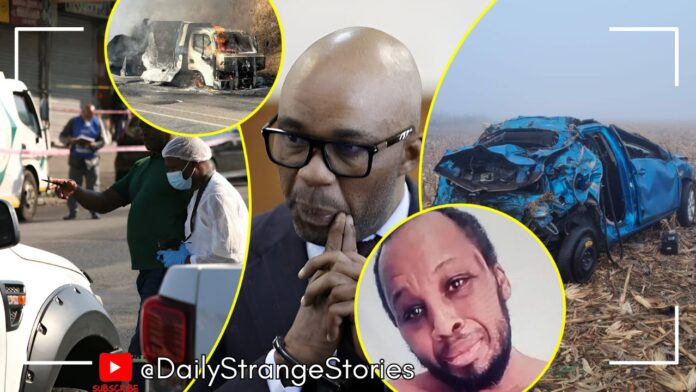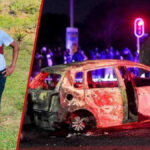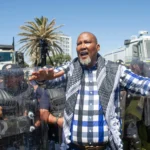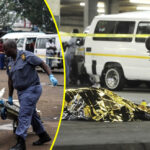In the bustling East London's central business district, a daring cash heist unfolded on Monday morning, claiming the lives of two security guards and leaving a trail of disruption in its wake. The event took place right outside Kausers Cash & Carry on Buffalo Street, one of the area's most active roads, where traffic flows heavily with commuters and taxi drivers starting their day. Around 7am, Fidelity guards were in the process of transferring cash from the store to their armored vehicle. One guard had just stepped out of the shop, carrying an orange money bag filled with an undisclosed sum, while another stood nearby, ready to assist in loading it into the truck.
Suddenly, four armed men appeared, launching their attack with precision. The first shots rang out, striking the guards in quick succession. One collapsed immediately at the scene, declared dead there, while the other, gravely wounded, was rushed to a nearby hospital but succumbed to his injuries shortly after. The driver of the cash-in-transit vehicle remained unharmed, witnessing the chaos from inside the truck. The attackers, described as calm and professional, included one dressed in a blue work jumpsuit resembling those worn by municipal workers, and another in shorts. They moved without masks, closing in on the guards who were positioned near the vehicle. The entire robbery lasted mere seconds, with the men grabbing the orange bag and fleeing in an old silver-grey Hyundai down Buffalo Street.
Eyewitnesses nearby heard between eight and ten shots, prompting people to scatter in panic. Some bystanders, including shop owners from adjacent businesses, rushed to the scene to check on those inside the Somali-owned store. They found the guards down, one motionless and severely injured, the other struggling. The incident, captured on CCTV footage, highlighted how the robbers ambushed the guards just as they emerged from the shop, with one robber standing close by, armed with a large weapon, before joining the others to overpower them. Emergency services, including police, the Hawks, ambulances, and forensic teams, arrived soon after, cordoning off the area and redirecting traffic, which caused significant delays for morning commuters. Staff at Kausers Cash & Carry were left deeply affected, with one woman worker needing assistance to exit the store.
This heist added to a growing pattern of crimes targeting foreign-owned businesses in the Buffalo City Municipality, where shopkeepers, especially Ethiopians and Somalis, face constant risks, particularly during stock deliveries or cash handling. Many have ended up in hospitals recovering from attacks, while others have not survived. Community leaders have pointed out that such incidents are driving away investors and endangering civilians with stray bullets, calling for increased police presence and better municipal action to protect these vulnerable areas.
Shifting focus to another part of the country, a similar cash-in-transit robbery occurred on the same day in Cottonlands, KwaZulu-Natal, where a group of fifteen heavily armed men targeted a security van in broad daylight. This attack happened just before 10 a.m. on Vincent Dickenson Road, as the vehicle traveled along the P100 toward Ndwedwe. The assailants, traveling in a white Isuzu D-Max bakkie and a white Nissan NP200 bakkie, opened fire with high-caliber weapons, forcing the guards to stop. They disarmed the security officers, taking two rifles and a handgun, before using explosives to blast open the rear of the van and escape with an undisclosed amount of cash. When response teams from Reaction Unit South Africa arrived, they found the vehicle engulfed in flames, but fortunately, no one was injured in the confrontation. Police have launched a manhunt for the suspects, who fled toward Ndwedwe, emphasizing that the guards were caught off guard while performing their routine duties. This incident underscores the coordinated nature of these heists, where large groups operate with military-like tactics, leaving behind burned-out vehicles to destroy evidence. Authorities are pursuing all leads, appealing for public assistance to track down the perpetrators who vanished into the surrounding areas.
Amid these high-stakes robberies, a scandal has emerged in Ekurhuleni, involving the metropolitan police department's chief, Julius Mkhwanazi, and his alleged ties to businessman Vusimuzi "Cat" Matlala, owner of CAT VIP Protection. Accusations point to Mkhwanazi approving an irregular agreement that allowed Matlala's private security firm to collaborate closely with official police operations, including access to sensitive crime intelligence typically reserved for state officials. Opposition parties like the Democratic Alliance and ActionSA have demanded Mkhwanazi's suspension, labeling the deal as unethical and possibly illegal, especially given Matlala's history of controversies. This is not the first time Mkhwanazi has faced scrutiny; back in 2023, he was suspended for abusing his authority, including handing out blue lights to friends and drafting documents that permitted Matlala's company to use council vehicles with emergency signals.
That investigation was mysteriously dropped, raising questions about who authorized its abandonment. Further fueling the fire, Matlala reportedly gifted Mkhwanazi a luxury black Mercedes Benz a few years ago, strengthening their apparent connections. The City of Ekurhuleni is now reviewing the matter, while civil society groups push for an Independent Police Investigative Directorate probe. This situation highlights deeper issues of governance and accountability within the policing structures, where personal relationships may influence decisions that compromise public safety and trust.
Turning to the roads of Mpumalanga, tragedy struck twice on that same Monday morning in 2025, resulting in the loss of ten lives in separate crashes. The first occurred on the R547 between Kinross and Kriel, where a sedan carrying four men lost control and overturned. All four, who were passengers and the driver, perished at the scene, while two others sustained serious injuries and were taken to a hospital in Evander for treatment. Investigators are examining factors like road conditions and driver behavior, noting that human error often plays a major role in such events. In the second crash on the N12 between Delmas and Emalahleni, an articulated truck collided with another truck that had been modified to transport workers. This vehicle was picking up employees on the roadside to take them to a nearby farm when the impact happened, killing six people on the spot. Among the survivors, six suffered serious injuries, and eleven had minor ones, all requiring hospital care. The Mpumalanga community safety department has stressed the need for motorists to stay alert and follow rules, pointing out that over eighty percent of collisions stem from reckless actions that claim innocent lives. Officials have extended condolences to the families and urged greater responsibility on the roads to curb the rising number of fatalities.
In a courtroom in the Eastern Cape, justice has been served for the calculated killing of a dedicated detective, with three men receiving life sentences. Thando "Flokkie" Mangolwane, aged twenty-five, Siyabonga "Jacks" Zimela, twenty-four, and Siphelo "Spikiri" Bebe, twenty-nine, appeared in the Bisho High Court, where evidence proved their roles in the 2021 ambush of Warrant Officer Phumlani Dastile in Zwelitsha. Bebe, already serving multiple life terms for earlier crimes, masterminded the plot from his prison cell using a cellphone, recruiting Mangolwane and Zimela through an acquaintance who later became a state witness. The pair traveled from Khayelitsha in the Western Cape to execute the plan, ambushing Dastile outside Monde's Tavern in Zone 4 during daylight hours and firing multiple shots at close range.
Cellphone records placed them at the scene, communications detailed their planning, and surveillance footage, along with witness testimonies from associates like the men's girlfriends, confirmed their movements. Mangolwane was identified as a shooter, while another drove the getaway vehicle. In addition to life imprisonment, Mangolwane and Zimela each got fifteen years for possessing a semi-automatic firearm and three years for ammunition, to run concurrently. The prosecution argued that this act directly challenged the rule of law, prioritizing severe punishment over the accused's personal circumstances. The Director of Public Prosecutions commended the teams involved, reinforcing commitment to protecting law enforcement.
A significant breakthrough has come in the fight against kidnappings in Nelson Mandela Bay, where the Hawks arrested two suspects linked to a recent abduction. The case involves seventy-three-year-old Theresa Minnie, taken from her Fairbridge Heights home in Kariega early one Monday morning in August 2025. As she drove out of her gate around 5:30 a.m., a Volkswagen Polo blocked her path, and two armed men forced her into their vehicle before speeding away. A ransom demand followed that day, prompting a multidisciplinary investigation by the Hawks' Serious Organised Crime unit, Crime Intelligence, the Local Criminal Record Centre, and Magma Security. Their efforts led to Minnie's release unharmed near the Kariega police station on Saturday night after a cash payment was made. Operations then targeted suspects' homes in Gqeberha, resulting in the arrests of two men aged twenty-nine and thirty-one. Authorities recovered a large sum of cash tied to the ransom, two vehicles used in the crime, and two firearms. Further searches in Motherwell uncovered another firearm and more cash.
The suspects are set to appear in the Kariega Magistrate's Court on August 19 and 20, 2025. This arrest is part of a broader response to a surge in kidnappings over the past year, with at least thirteen cases in the area, many involving ransom. Examples include a forty-five-year-old teacher taken outside Happydale Special School in Algoa Park in March 2025 and released three days later; American missionary Josh Sullivan abducted during a church service in Motherwell in April and rescued after five days in a police operation; businessman Ebrahim Moosa kidnapped from his premises near Kariega in February and freed a week later with two arrests; two foreign nationals taken in mid-February; a Somali abducted in Gelvandale in November 2024 and released after three days; Somali student Qays Mohaned Hersi Mohamoud kidnapped in the same area and later freed unharmed; Kelvin Naidoo, deputy president of the Nelson Mandela Bay Business Chamber, taken in July 2024 and released six days later; Lindsay Knowlden abducted from a fresh produce market in Markman in July, with her husband injured; a woman from Cleary Estate kidnapped on July 3, followed by businessman Chris Kaldelis on July 8; a local businessman released in August without ransom after community intervention; and another businessman taken in Korsten last week but freed similarly. Crime statistics show kidnappings rising from fourteen in the second quarter of 2024 to thirty-five in 2025, with the Eastern Cape recording thirteen ransom-related cases in a national sample.
Provincial leaders have deployed a twenty-four-hour standby team and additional task forces, while opposition figures call for a permanent joint operations center to enhance intelligence sharing, targeted actions, and prosecutions. Meanwhile, the search continues for businessman Jerry Boshoga, kidnapped in Rooihuiskraal, Centurion, in November 2024 after a meeting. His brother drove him there, and after he stepped away briefly, calls went unanswered, leading to a ransom demand starting at sixty million rand and dropping to ten million by January 2025. Disturbing videos of his mistreatment circulated, but police confirm he remains missing, urging responsible reporting to avoid hindering the sensitive investigation. In our news bulletin tomorrow, we will report why Jerry Boshoga, who, according to his own mother, was Cat Matlala's best friend, was kidnapped. So make sure you tune in tomorrow for more details about what led to Jerry Boshoga's kidnapping.
In Limpopo's Vhembe District, a double murder has prompted an intensive manhunt after two Zimbabwean men were found shot dead in Ha-Rangani Village on a Sunday morning in 2025. Police responded to gunfire reports around 7:30 a.m., discovering a white Toyota Hilux 2.8 GD abandoned in the bush near a gravel road. One victim, aged thirty, sat in the driver's seat with multiple gunshot wounds, while the twenty-eight-year-old lay nearby, also fatally wounded. Both hailed from Bulawayo, with one residing in Musina Location and the other in Ha-Rangani. The motive is unclear, but evidence at the scene includes live ammunition, spent cartridges, and a cellphone now under forensic analysis. The case, opened as double murder at Masisi Police Station, has been handed to the Provincial Organised Crime Unit. Commissioner Lieutenant General Thembi Hadebe has mobilized resources for swift arrests, appealing for tips via Lieutenant Colonel Rodney Ndou or other channels.
These events coincide with statements from EFF leader Julius Malema, who addressed supporters at a rally in Seshego, Limpopo, urging Zimbabweans in South Africa to seek jobs back home while emphasizing priority for locals. He clarified that South Africans should get first preference in employment, especially in municipalities, without denying opportunities to others, but suggested Zimbabweans pursue work in places like Harare. This comes amid accusations against Polokwane Mayor John Mpe for awarding tenders to foreign-owned companies, including one linked to a Zimbabwean associate of the municipal manager. Mpe defended the processes as lawful. Malema's remarks reflect a shift from his earlier support for Pan-African unity and open borders, where in 2022 he defended hiring Zimbabweans while prioritizing locals and even offered transport for them to vote in Zimbabwe against ZANU-PF. Analysts note this aligns with South Africa's youth unemployment crisis, with 62.4 percent of those aged fifteen to twenty-four jobless, 46.1 percent for fifteen to thirty-four, and 40.4 percent for twenty-five to thirty-four, worsening over the decade. Malema now stresses that taxpayer-funded projects must benefit citizens first, encouraging communities to demand accountability. Commentators see this as adapting to public sentiment on immigration, a global challenge, while cautioning against division and advocating for humane solutions rooted in economic and historical ties.
What do you think should be done to address the rising crime and unemployment issues in South Africa—share your ideas in the comments below to help spark a national conversation?

Follow Us on Twitter











